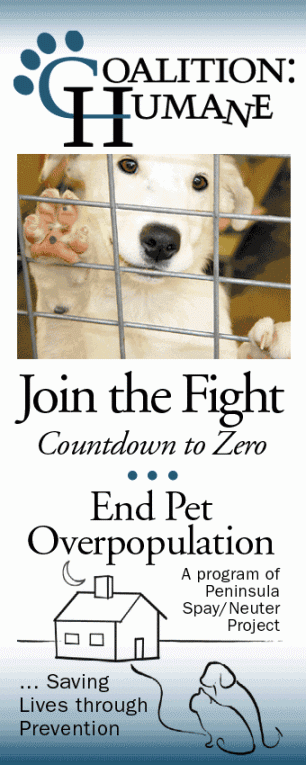Pit bull lovers pull together to polish image
KATHLEEN MERRYMAN; THE NEWS TRIBUNE
Published: 01/14/09 12:05 am
At last, someone's come up with a pit bull program that won't send
people into apoplexy.
Four groups of folks who love pits are sponsoring "The Responsi-Bull
Project," which begins Thursday.
These people are given to puns, which indicates a sense of humor.
That's a great relief where pit bull-type dogs are concerned. If you
can think of any dog that prompts more divisive debate, please let me
know.
Andrea Logan of Pawsitive Alliance (I warned you about the puns) is
coordinating Responsi-Bull, which offers free spaying and neutering, a
free workshop for owners and a four-week obedience course.
Quantcast
It aims to cut the number of pit bulls born into bad homes and raised
to be aggressive. Along the way, organizers hope to rehabilitate the
breed's image. Pits can be good dogs, Logan said, not a gang fad. Not
teeth on a leash.
"Pit bulls have become the breed of choice for many irresponsible
people, and consequently are flooding animal shelters," Logan said,
speaking nationally. "An estimated one third of dogs entering our
shelters are pit bulls or pit bull mixes, and 90 percent of those dogs
will not find a home."
Responsi-Bull Project's first step, Pit-Fix, is to reduce the supply
of dogs crummy owners can exploit.
Starting Thursday, Coalition Humane Spay & Neuter Clinic will alter 30
pit bulls for free. Using maximum breeding math, Logan estimated this
could prevent 8,000 pit births.
There are strings attached to the free alterations, but they are
easily untied, said Coalition Humane board President Holly Bukes. By
state law, the clinic at 2106 Tacoma Ave. S. in Tacoma can perform
free or low-cost spaying only on pets of low-income Pierce County
residents.
"Call anyway," said Bukes, a pit bull owner.
The number is 253-627-7729.
People who don't think they qualify often do, Bukes said. Others get
referred to spay and neuter resources.
Altering dogs is a kindness all around, Logan said. The 2002 Texas
Severe Animal and Bite Surveillance Summary found unaltered dogs were
responsible for 82 percent of serious attacks. Of aggressors in fatal
attacks, 97 percent were unaltered.
Joseph Hunt, a Tacoma Animal Control and Compliance officer, sees it
all the time.
"Yesterday an officer was out with a female in heat, and two males
fought each other over the female," Hunt said.
He has been referring pet owners to Pit-Fix and the two training programs.
BullsEye Dog Rescue will host Pit-Ed, a free workshop on pit bull
ownership. BullsEye co-founder Lorrie Kalmbach-Ehlers will teach the
class from 2 to 4 p.m. Sunday at Positive Approach Dog Training, 1501
S. Center St., Tacoma. Contact her at 360-981-7080 or
lorrie@bullseyerescue.org for a spot.
BullsEye and Positive Approach are co-sponsoring Train-A-Pit, a series
of four obedience classes. Train-A-Pit has a registration fee of $40,
but owners get $10 back at each class they attend. It's a deal. The
class is a $150 value.
Sessions begin Jan. 24 and meet Saturdays from 4 to 5 p.m. and 5:30 to
6:30 p.m. at Positive Approach. Kalmbach-Ehlers is taking
registrations. Her first rescue dog was a pit bull, and she's had
nothing but pits ever since.
This is Responsi-Bull's second time around, said Logan, who rounded up
$3,000 in donations to pay for it. She's hoping to put it on four
times a year.
Already the Humane Society for Tacoma & Pierce County is seeing
results from combined efforts to reduce pit bull euthanasia. Tacoma's
new animal control rules penalize owners of dangerous and unaltered
dogs. Pit bull rescue groups are working to save, spay and train, and
find homes for dogs that can be good family members. Veterinarians are
making spaying and neutering affordable.
None of these efforts can succeed alone. But Marguerite Richmond of
the Humane Society said that together, they are saving animals.
In 2007, she said, 1,145 pit bulls came into the animal shelter. In
2008, that number was down 32 percent, to 774.
In 2007, Humane Society workers put down 673 pit bulls. In 2008, that
was down 40 percent to 404.
Now that's what you call a dog treat.
Kathleen Merryman: 253-597-8677
kathleen.merryman@thenewstribune.com
Wednesday, January 14, 2009
Coalition: HUMAnE in the News!
Subscribe to:
Posts (Atom)
